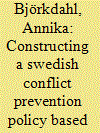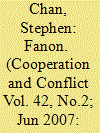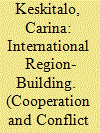| Srl | Item |
| 1 |
ID:
077427


|
|
|
|
|
| Publication |
2007.
|
| Summary/Abstract |
The story of how conflict prevention became an integral and legitimate part of Swedish foreign policy illustrates the relationship between successful practices and powerful ideas. This article suggests that the demonstration of an idea in practice empowers the idea and contributes not only to its selection, but also to its framing and institutionalization within foreign policy. Hence, the article sets out to explore the relationships between practice, ideas and foreign policy. Adopting a social constructivist perspective, the article provides a detailed process-tracing of the construction of a Swedish conflict prevention policy and concludes that conflict prevention was a powerful idea because it was morally appealing and persuasive as well as successfully demonstrated in practice. In fact, preventive practices spearheaded the advancement of the conflict prevention idea. In addition, the idea resonated with the Swedish foreign policy elite, with commonly held values and with the traditional Swedish foreign policy that stressed internationalism and solidarity
|
|
|
|
|
|
|
|
|
|
|
|
|
|
|
|
| 2 |
ID:
077426


|
|
|
|
|
| Publication |
2007.
|
| Summary/Abstract |
Frantz Fanon has always been read as an apostle of violence - much of this owed to Sartre's Preface to Fanon's work, The Wretched of the Earth. There are, however, more nuanced possible readings of Fanon, readings that allow the possibility of new understandings of contemporary violence emanating from the Middle East. In this article, Fanon's intellectual trajectory is traced back to his first writings postulating an equality in which no slaves existed by virtue of there being no longer any masters. The psychological dimensions of Fanon's work are discussed and a hypothesis put forward about a moment of pure psychological lucidity and calm before the suicide bomber of today explodes his or her device. The work of Lacan and Kristeva is discussed in relation to a nuanced reading of Fanon, and an excursion into the Palestine of Hamas helps complete a complex meditation on Fanon's life and work
|
|
|
|
|
|
|
|
|
|
|
|
|
|
|
|
| 3 |
ID:
077428


|
|
|
|
|
| Publication |
2007.
|
| Summary/Abstract |
The Arctic has emerged as a region in international cooperation during the past 20-30 years, as manifest in the creation of the Arctic Council and its predecessor, the Arctic Environmental Protection Strategy, and in the incidence of a host of scientific and political cooperation projects. The region now includes eight states over the circumpolar area; namely, the United States, Russia, Canada and the Nordic countries. How this international region has developed over time is investigated with reference to the conception of regions as understood in region-building discourse. Accordingly, the Arctic as a region that is not natural or given but as constructed by and for particular actors and interests is studied. It is concluded that the regional superstructure includes conceptions of the North that draw on images developed in historical exploration and research, shaped by a discourse of the Arctic representing North American more than Nordic understandings.
|
|
|
|
|
|
|
|
|
|
|
|
|
|
|
|
| 4 |
ID:
077429


|
|
|
|
|
| Publication |
2007.
|
| Summary/Abstract |
The European Union (EU) and the Common Market of the South (Mercosur) are very different regions that have come to seemingly analogous compromises as far as the operation of their common markets is concerned. Like the EU, Mercosur seems to confirm the textbook logic of integration development from a free trade area to a customs union and then to a common market. Does this mean that well-developed theories of European integration that emphasize certain properties of the European region are useless in explaining and predicting the Mercosur process? This article proposes a framework for comparison of the two blocs that uses selected theories of European integration: neofunctionalism, liberal inter-governmentalism, social constructivism and neo-realism. The framework is applied to the examination of intra-regional cohesion of the two interstate cooperative groups. Comparison of the two unions demonstrates that, despite similar institutional structures and partial set-ups of the common markets, they are qualitatively different processes that are highly conditioned by their unique regional properties. There is therefore no contradiction between Mercosur and the predictions of the Mercosur integration based on the theories of European integration. At the same time, Mercosur is strongly affected by the passive and active influence of the EU. However, the one-size-fits-all prescriptions for regionalism in the global south should be critically reevaluated. Mercosur and other regions have to optimize their development looking for solutions to specific regional problems rather than trying to adapt textbook models of integration derived from integration experience of the EU or NAFTA. The study emphasizes the importance of non-economic factors of integration and the necessity to evaluate the success of integration associations outside Europe in the context of local social realities rather than against the EU criteria
|
|
|
|
|
|
|
|
|
|
|
|
|
|
|
|